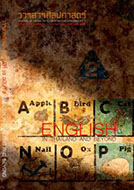Measuring Vocabulary Size and Vocabulary Depth of Secondary Education Students in a Thai-English Bilingual School
Main Article Content
บทคัดย่อ
This paper reports findings from a study which measured the vocabulary knowledge of 12th grade students of a Thai-English Bilingual Program in the school. The study investigated two dimensions of vocabulary knowledge, namely breadth or vocabulary size and depth. The Vocabulary Levels Test (VLT) version 2 and the Depth of Vocabulary Knowledge Test (DVK) were administered to 104 subjects. The findings indicated that the students could not reach the targeted 3000 word level which was the threshold level for this study. Furthermore, the average vocabulary size was below the 2000 word level. The mean scores of the students’ vocabulary sizes at Academic Word List level (AWL) were below the minimum requirement. Likewise, the mean scores of the students’ depth of vocabulary knowledge were lower than 50% of the total scores. The results confirmed that over fifty percent of the subjects had some vocabulary deficiencies that would hinder their academic progress.
งานวิจัยนี้ศึกษาการวัดความรู้คำศัพท์ของนักเรียนชั้นมัธยมศึกษาปีที่ 6 หลักสูตรสองภาษา ไทย-อังกฤษ ของโรงเรียนแห่งหนึ่ง โดยวัดความรู้คำศัพท์ทั้งสองมิติคือความรู้ในเชิงขนาด หรือเชิงกว้างและความรู้ในเชิงลึก กลุ่มตัวอย่างจำนวน 104คนได้ทำแบบทดสอบสองฉบับ เพื่อวัดระดับความรู้คำศัพท์ในเชิงกว้างและเชิงลึกผลการทดสอบพบว่ากลุ่มตัวอย่างมีขนาดความรู้คำศัพท์ต่ำกว่าเกณฑ์ที่กำหนดไว้คือ ระดับ 3,000 คำ อีกทั้งคะแนนเฉลี่ยของความรู้คำศัพท์ต่ำกว่า 2,000 คำนอกจากนี้คะแนนเฉลี่ยของความรู้คำศัพท์เชิงวิชาการทั่วไปอยู่ในระดับที่ต่ำกว่าเกณฑ์ด้วย ส่วนคะแนนเฉลี่ยของความรู้คำศัพท์ในเชิงลึกนั้น อยู่ในระดับต่ำกว่าร้อยละ 50 ผลการวิจัยนี้สรุปว่า กลุ่มตัวอย่างจำนวนมากกว่าร้อยละ 50 มีความรู้คำศัพท์ไม่เพียงพอ ซึ่งจะเป็นอุปสรรคตในการศึกษาต่อ ที่เกี่ยวข้องกับการใช้ภาษาอังกฤษในอนาคต


